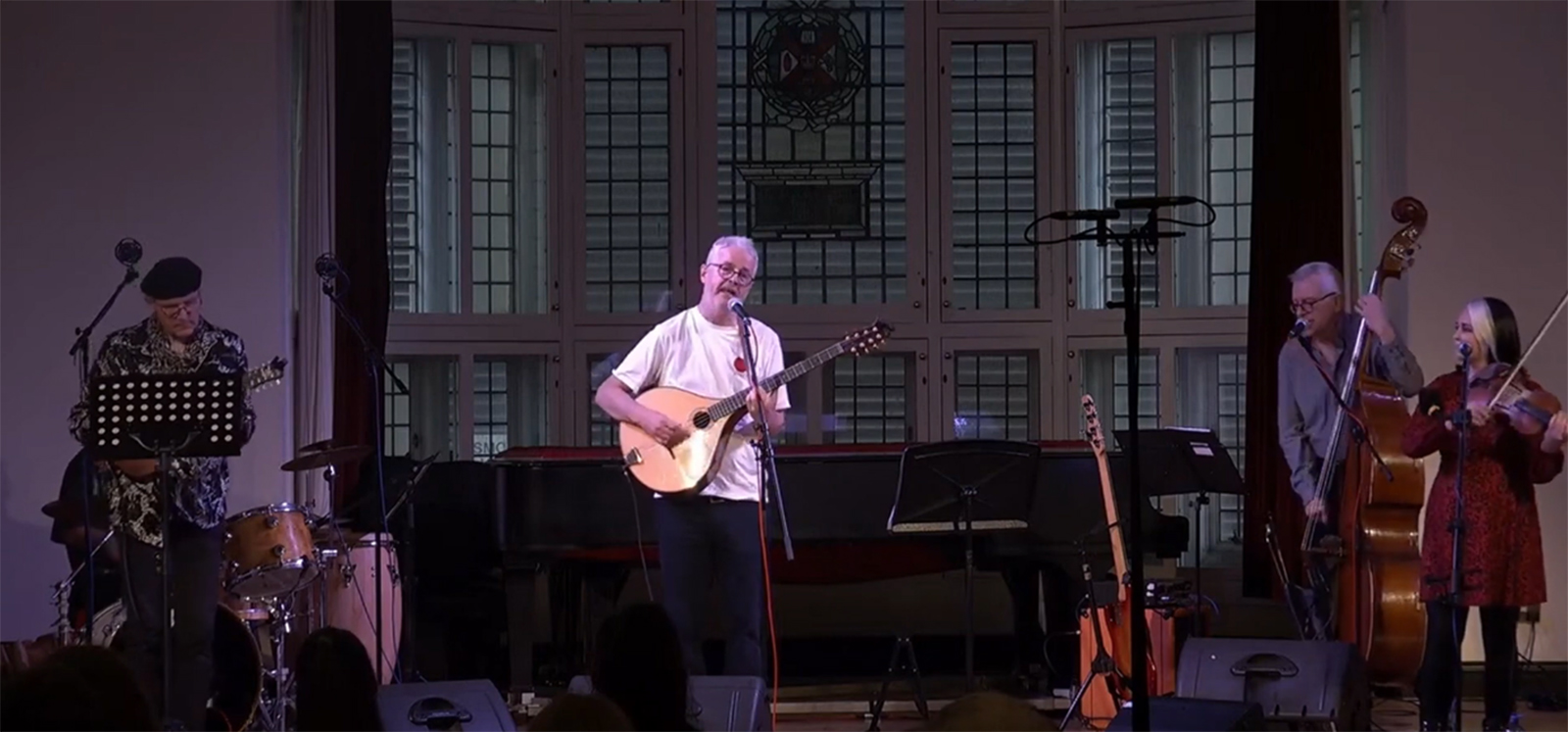Gerhard Gundermann’s Songwriting in the Context of Deindustrialisation & Globalisation in the 1990s
Dr David Robb

For my AHRC Research Engagement and Development Fellowship (2022-24) I have been examining the work and career of the East German singer/songwriter and dramatist Gerhard Gundermann (1955-98).
His case offers a fascinating study of political music in the transition period between the industrial 1970s of the GDR and the post-industrial 1990s in unified Germany. He was well placed to artistically process this transition: for his day job Gundermann drove an excavator in an open cast mine in the brown coal region of Lusatia. He was made redundant from this profession in 1996, two years before his premature death in 1998.
Throughout his work, from the early 1980s onwards, one can observe conflicting local and global perspectives: that of the need for coal as an energy supply and source of employment side-by-side with an increasing awareness of the environmental damage that it caused. A target of his criticism in this respect is the exploitative tendencies of social and economic structures. Gundermann was ahead of his time in anticipating the anti-capitalist discussion on globalisation which emerged after his death in works of the early 2000s such as Hardt and Negris’ Empire (see Simone Hain, 2005).
In his later songs, and particularly in the interviews he gave shortly before his death, he philosophises on the potential for resistance within a new globalised order in which traditional structures have changed, but economic inequality and the plight of the poor persist.
Although his songs reflect the harshness of life, the bitter betrayals and disappointments that lead to the displacement of workers in search for new horizons, there is also a utopian streak in his writing. Influenced by the GDR novel Krabat oder die Verwandlung der Welt (Krabat or the Transformation of the World) by Sorbian writer Jurij Brězan (1976) and its sequel Krabat oder die Bewahrung der Welt (Krabat or the Preservation of the World) from 1995, Gundermann sees hope in the regenerative power of nature which humankind has a moral duty to protect. This finds expression in songs such as ‘Gras’ (Grass) and ‘Soll Sein’ (Shall Be) from his 1992 album Der siebente Samurai.
As part of my Fellowship, I received funding to translate and record ten songs of Gundermann. I have recently released those on the CD Filling Station for Losers (Buschfunk 2024). On this album I chose to include a selection of songs from Gundermann’s post-German unification period, a time of increasing deindustrialisation, in which the issues he expressed were no longer entirely GDR-specific. Rather the themes of winners and losers, social conflict, migration and the threat to the environment are common to countries throughout the contemporary world.
Recordings of my new song translations and summaries of their content can be found on my project website. This also contains a short documentary film in which I explain the significance of Gundermann’s work.
I wrote an essay on the making of the album Filling Station for Losers. In this I meditate on the process of creative practice, on the linguistic and musical dialogue I had with Gundermann that resulted in my new adaptations of his work.
The inspiration for this latest project came from my previous participation as a musician and translator in the ‘Gundermanns Lieder in Europa’ project. This took place as part of the activities marking the twentieth anniversary of Gundermann’s death in June 2018. Organised by Seilschaft e.V., the association that promotes the singer’s legacy, it took the form of a week-long workshop in Großräschen culminating in a concert in Hoyerswerda the following weekend.
Musicians from around Europe took part, translating selected Gundermann songs into their own languages. They included George Leitenberger singing in French, Pier Angelo (Italian), Johan Meijer (Dutch), Jan Řepka (Czech), Aleksander Trąbczyński (Polish), Zhenja Oks (Russian), Pittkunings (Sorb), Hugo Dietrich and Carmen Orlet (Low German), Jos Koning (Swedish), Claudio Herrera (Spanish) as well as myself.
The musicians all had varying musical styles often reflecting the folk music of the countries they came from. Their adaptations were, however, not confined to folk, other influences seeping in from rock, blues and jazz. Subsequently we recorded the CD Gundermanns Lieder in Europa which was released by Gundermann’s label Buschfunk in 2019. The CD was voted album of the month by the magazine www.liederbestenliste.de in October 2019.
The whole experience allowed me to rediscover the full depth and range of Gundermann’s work, it documented the boundary-crossing, universal qualities of his songs, and set up a strong international network for future collaborations.
I have placed three academic articles about Gundermann in journals in the past 12 months:
- ‘A Heroism for the New Times in the Protest Songs of Gerhard Gundermann’, Popular Music 43/2 (2025), forthcoming
- The influence of Brigitte Reimann's Franziska Linkerhand on the political songs of Gerhard Gundermann’, German Life & Letters 77, 4 (2024), pp. 514-537
- ‘The Krabat Motif in the Songs and Musicals of ‘Liedermacher’ Gerhard Gundermann’, Music & Politics 18 (2024)
Dr Dave Robb
Mitchell Institute Fellow: Religion, Arts and Peacebuidling, Dr Dave Robb is a Reader in Music in the School of Arts, English and Languages at Queen’s University Belfast. His research has focussed on the role of musical forms of protest in German history going back to the 1848 Revolution. Completing his PhD at the University of Sheffield in 1995 he was a post-doctoral tutor at the Humboldt University in Berlin before being appointed to German Studies at Queen’s in 1999. Dave is also a musician and songwriter.
